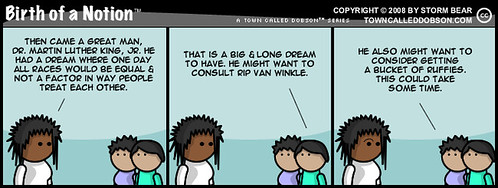Crossposted from Left Toon Lane, Bilerico Project & My Left Wing

click to enlargeBirth Of A Notion Disclaimer
From Wikipedia:
The March on Washington for Jobs and Freedom was a large political rally that took place in Washington, D.C. on August 28, 1963. Martin Luther King, Jr. delivered his historic "I Have a Dream" speech advocating racial harmony at the Lincoln Memorial during the march.
The march was organized by a group of civil rights, labor, and religious organizations, under the theme "jobs, justice, and peace." Estimates of the number of participants varied from 200,000 (police) to over 300,000 (leaders of the march). About 80% of the marchers were African American and 20% white and other ethnic groups.
The march is widely credited as helping lead to the Civil Rights Act (1964) and the National Voting Rights Act (1965).
The march was initiated by A. Philip Randolph (international president of the Brotherhood of Sleeping Car Porters, president of the Negro American Labor Council, and vice president of the AFL-CIO), who had planned a similar march in 1941. The threat of the earlier march had convinced President Roosevelt to establish the Committee on Fair Employment Practice and bar discriminatory hiring in the defense industry.
The 1963 march was organized by Randolph, James Farmer (president of the Congress of Racial Equality), John Lewis (president of the Student Nonviolent Coordinating Committee), Martin Luther King, Jr. (president of the Southern Christian Leadership Conference), Roy Wilkins (president of the NAACP), and Whitney Young (president of the National Urban League). Bayard Rustin, a civil rights veteran and organizer of the 1947 Journey of Reconciliation, the first of the Freedom Rides to test the Supreme Court ruling that banned racial discrimination in interstate travel, administered the details of the march.
The march was not universally supported among African-Americans. Some civil rights activists were concerned that it might turn violent, which could undermine pending legislation and damage the international image of the movement and they were self conscious. The march was condemned by Malcolm X, spokesperson for the Nation of Islam, who termed it the "farce on Washington".
March organizers themselves disagreed over the purpose of the march. The NAACP and Urban League saw it as a gesture of support for a civil rights bill that had been introduced by the Kennedy Administration. Randolph, King, and the SCLC saw it as a way of raising both civil rights and economic issues to national attention beyond the Kennedy bill. SNCC and CORE saw it as a way of challenging and condemning the Kennedy administration's inaction and lack of support for civil rights for African-Americans.
The speakers included all six civil-rights leaders of the so called, "Big Six (civil rights)"; Catholic, Protestant, and Jewish religious leaders; and labor leader Walter Reuther. The one female speaker was Josephine Baker. James Farmer, who was imprisoned in Louisiana at the time, had his speech read by Floyd McKissick
Media attention gave the march national exposure, carrying the organizers' speeches and offering their own commentary. In his section The March on Washington and Television News, William Thomas notes: "Over five hundred cameramen, technicians, and correspondents from the major networks were set to cover the event. More cameras would be set up than had filmed the last Presidential inauguration. One camera was positioned high in the Washington Monument, to give dramatic vistas of the marchers".
On August 28, more than 2,000 buses, 21 special trains, 10 chartered airliners, and uncounted cars converged on Washington. The regularly scheduled planes, trains, and buses were also filled to capacity.
The march failed to start on time, because its leaders were meeting with members of Congress. To the leaders' surprise, the assembled group began to march from the Washington Monument to the Lincoln Memorial without them.
Representatives from each of the sponsoring organizations addressed the crowd from the podium. Floyd McKissick read James Farmer's speech because Farmer had been arrested during a protest in Louisiana; Farmer had written that the protests would not stop "until the dogs stop biting us in the South and rats stop biting us in the North."
Musician Bob Dylan performed several songs, including "Only a Pawn in Their Game," about the culturally-fed racial hatred amongst Southern whites that led to the assassination of Medgar Evers; and "When the Ship Comes In," during which he was joined by fellow folk singer Joan Baez.
King gave his famous I Have a Dream speech, which was carried live by TV stations.
Although one of the officially stated purposes of the march was to support the civil rights bill introduced by the Kennedy Administration, several of the speakers criticized the proposed law as insufficient.
John Lewis of SNCC was the youngest speaker at the event. His speech—which a number of SNCC activists had helped write—took the Administration to task for how little it had done to protect southern blacks and civil rights workers under attack in the Deep South. While he toned down his comments under pressure from others in the movement, his words still stung:
We march today for jobs and freedom, but we have nothing to be proud of, for hundreds and thousands of our brothers are not here—for they have no money for their transportation, for they are receiving starvation wages…or no wages at all. ...
We come here today with a great sense of misgiving. It is true that we support the administration's Civil Rights Bill. We support it with great reservation, however. ... Unless title three is put in this bill, there's nothing to protect the young children and old women who must face police dogs and fire hoses in the South while they engage in peaceful demonstration. In its present form this bill will not protect the citizens of Danville, Virginia, who must live in constant fear of a police state. ... As it stands now, the voting section of this bill will not help the thousands of people who want to vote. ... We must have legislation that will protect the Mississippi sharecroppers, who have been forced to leave their homes because they dared to exercise their right to register to vote.
We need a bill that will provide for the homeless and starving people of this nation. We need a bill that will ensure the equality of a maid who earns five dollars a week in the home of a family whose total income is 100,000 dollars a year. We must have a good FEPC bill.
My friends let us not forget that we are involved in a serious social revolution. By and large, politicians who build their career on immoral compromise and allow themselves an open forum of political, economic and social exploitation dominate American politics. ... what political leader can stand up and say, "My party is a party of principles"? For the party of Kennedy is also the party of Eastland. The party of Javits is also the party of Goldwater. Where is our party? Where is the political party that will make it unnecessary to march on Washington? Where is the political party that will make it unnecessary to march in the streets of Birmingham? Where is the political party that will protect the citizens of Albany, Georgia? ... We must say wake up America, wake up its now 2:00 in the afternoon! For we cannot stop, and we will not and cannot be patient.
Cut from his original speech at the insistence of more conservative and pro-Kennedy leaders were phrases such as:
In good conscience, we cannot support wholeheartedly the administration's civil rights bill, for it is too little and too late.
I want to know, which side is the federal government on?
The revolution is a serious one. Mr. Kennedy is trying to take the revolution out of the streets and put it into the courts. Listen, Mr. Kennedy. Listen, Mr. Congressman. Listen, fellow citizens. The black masses are on the march for jobs and freedom, and we must say to the politicians that there won't be a "cooling-off" period.
We will march through the South, through the heart of Dixie, the way Sherman did. We shall pursue our own scorched earth policy and burn Jim Crow to the ground—nonviolently...
Many activists from SNCC, CORE, and even SCLC were angry at what they considered censorship of his speech.
BIRTH OF A NOTION WALLPAPER is now available for your computer. Click here. |

![]()








0 comments:
Post a Comment